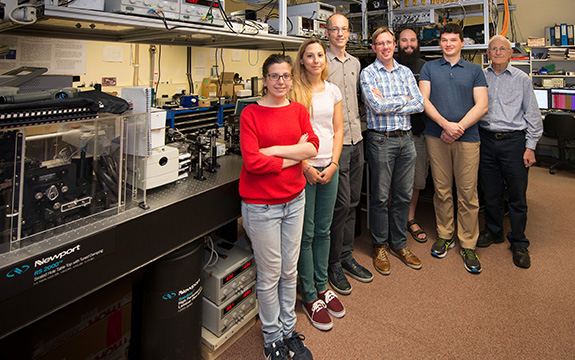Swinburne researchers contribute to newly launched FLEET Centre

In Summary
- Swinburne will contribute to research to create low-energy electronics with near-zero energy waste
- The Ultracold Atomic Gas Lab is paving the way for new discoveries in quantum technologies
- The Ultrafast Spectroscopy Lab uses light pulses quadrillionths of a second long to create temporary topological states
Swinburne researchers will collaborate with the newly launched Australian Research Council Centre of Excellence in Future Low-Energy Electronics Technologies (FLEET) to address the hidden energy costs of computing.
The Centre will use the emerging science of topological materials recognised by the 2016 Nobel Prize in Physics. It will make use of atomically-thin, 2D materials, to create ultra-low energy electronics that achieve zero, or near-zero, wasted dissipation of energy.
Information and communications technology is responsible for five to eight per cent of global electricity use, with most of that energy consumption hidden in vast, factory-sized data centres.
Swinburne will contribute to the efforts of FLEET through Associate Professor Chris Vale’s Ultracold Atomic Gas Lab, which creates topological states in Bose-Einstein condensates at a billionth the temperature of outer space.
“Our team is developing a next-generation facility that will allow Australian researchers to control and image individual atoms in ultracold gases, paving the way for new discoveries in quantum technologies,” says Associate Professor Vale.
Additionally, Swinburne researchers in Associate Professor Jeff Davis’s Ultrafast Spectroscopy Lab use light pulses quadrillionths of a second long to force atomically-thin semiconductors into a temporary topological state.
Both these experiments will enhance the understanding of and ability to control topological phase transitions, which could assist in future low-energy, topologically-based electronics.
“FLEET places Australia at the forefront of exciting new scientific research, building capacity for advanced electronics research and training today’s workforce for the electronics industry of the future,” says FLEET Director Professor Michael Fuhrer.
FLEET is a collaboration of more than 100 researchers at seven universities and 13 Australian and international science organisations.

